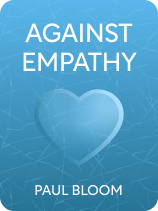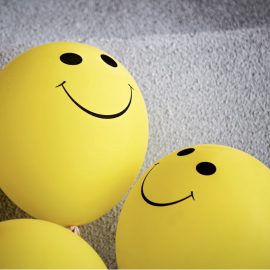

This article is an excerpt from the Shortform book guide to "Against Empathy" by Paul Bloom. Shortform has the world's best summaries and analyses of books you should be reading.
Like this article? Sign up for a free trial here.
Do we need empathy to understand and practice morality? What should guide our moral decisions?
In Against Empathy, psychologist Paul Bloom argues that we rely too heavily on our emotions—especially empathy—to guide our judgments, decisions, and behavior. He suggests that our empathic responses to other people can lead us away from the morally good and right course of action.
Read more to learn how to be a moral person by putting empathy in what Bloom believes is its proper place.
Understanding & Practicing Morality
In his book, Bloom explains why he believes that empathy isn’t the best way to understand morality. Then, he shares his advice on how to be a moral person.
We Don’t Need Empathy to Understand Morality
One of the reasons that Bloom argues that empathy is an inadequate guide for our moral decisions is that our moral system consists of more than simple empathic responses. Bloom suggests that children’s ability to help others, perhaps without true empathy, shows that we can behave in ways that care for others without feeling their emotions or taking on their experiences.
Bloom considers the idea that empathy might represent a developmental stepping stone toward a more mature understanding of morality. But, he concludes that we don’t have enough evidence to know whether children help others because they’re empathizing (feeling what others are feeling) or because they’re just caring for others. Because the evidence is inconclusive, Bloom writes that we can’t demonstrate that empathy is necessary for the development of morality.
| Can Children Understand Morality Before They Understand Empathy? Though Bloom leaves questions about the development of empathy open, researchers have some theories about when and how children gain the ability to empathize with others. Even before that developmental milestone, they can behave helpfully and morally. Answers as to why might lie in the neocortex, the part of the brain that evolved the most recently. In The Body Keeps the Score, psychiatrist Bessel van der Kolk explains that the neocortex is the last part of the brain to fully develop (so the skills it enables are still maturing in childhood). In addition to enabling empathy, this part of the brain is also involved in language, abstract thought, imagination, and creativity. It even helps us to plan for the future and reflect on the past. The frontal lobes, part of the neocortex, seem to play an important role in morality and moral decisions. By age 7 to 12, typically developing children are able to empathize with others. But if a child has deficits in the capacities that support empathy, adults usually notice long before age 7. Children with a notable lack of empathy, guilt, and moral regulation even as early as preschool seem to show more aggressive or violent tendencies later. Experts also believe that children have to develop a “moral identity” to understand empathy and learn to behave in empathetic ways. Then, the natural skills that form the root of empathy can develop into more mature and deliberate behavior. The development of a sense of morality seems to rely on both emotional and cognitive processes, and empathy likely plays an important role in the development of moral judgment. |
How Can We Make Better, More Moral Decisions?
If you want to follow Bloom’s advice to rely less on empathy and more on rational compassion to guide your decisions, it might help to have an idea of where to start. We’ll explore four ideas that Bloom offers for making better decisions: strategies that involve exercising your capacity to think rationally—and use empathy productively and appropriately.
Exercise Self-Control
The first strategy for improving compassionate decision-making is to practice self-control, even in situations where you tend to react emotionally. Bloom writes that self-control may be the most useful measure of rational thinking because exercising self-control requires you to check your emotions, impulses, and irrational thinking. Practicing self-control can help you use rational compassion instead of empathy when you make decisions.
(Shortform note: Experts believe that self-control comprises a number of key elements, including the abilities to defer gratification and act cautiously. In much the same way that Bloom considers self-control and rational thinking intertwined, experts also cite cognitive ability as an important component of self-regulation. After all, exercising self-control often involves tasks like rationally considering all of our options before making a decision.)
Focus on the Decisions That Matter
Another strategy that might help you to make better moral decisions involves paying particular attention to the choices that matter most. Bloom writes that it’s most important to behave rationally when we’re making decisions that affect other people: These are situations in which the choices we make carry moral weight.
By drawing on our innate concern for treating people kindly and equitably and not harming them, we can make decisions that treat every person as valuable, according to Bloom. This can help us act more compassionately toward everyone than we would if we relied solely on our emotional responses since we feel the value of the lives of those closest to us more keenly.
(Shortform note: One way to proceed rationally when you make a choice that affects others is to focus on making an ethical decision, which experts say requires a sensitivity to the implications of your choices and a method for considering the factors that influence your decision. You can use three frameworks to make more moral decisions: a consequentialist framework, which examines the future effects of a decision with the goal of producing the best outcome; a duty framework, which considers your obligations in a given situation; or a virtue framework, which focuses on the kind of person you want to be in your relationships with others.)
Consider the Consequences
A third technique to improve your decision-making process involves considering the repercussions that your choices may have for other people. Bloom writes that to make choices that are morally good, you have to anticipate the consequences of your actions. Since empathy doesn’t always have positive consequences—and often has negative ones, as Bloom argues throughout the book—thinking through the possible consequences of your actions can help you make more moral decisions and optimize your chances of achieving good results.
(Shortform note: Though many experts agree that we should try to anticipate the consequences of our actions, some say that consequences aren’t the most reliable measure of the merit of our decisions. In Thinking in Bets, poker player Annie Duke warns against “resulting,” or judging a decision solely by its outcome. Achieving a good outcome can be difficult under conditions of uncertainty, and Duke argues that we should aim to engage in a decision-making process that we can stand behind regardless of the ultimate outcome of the decision.)
Use Empathy Productively
Finally, Bloom concludes that it’s important to put empathy into its proper place in our decision-making processes. We can lean on our emotions to motivate us to do good, but we can use our reasoning abilities to figure out how to do good. Empathy’s weaknesses can outweigh its strengths when we use it in the wrong context. When we need to make decisions with moral weight, it makes sense to use alternatives such as rational compassion.
(Shortform note: Experts offer many perspectives on how we learn to behave morally and the extent to which reasoning assists that process. In The Happiness Hypothesis, Jonathan Haidt explains that the idea of reasoning your way to morality—similar to what Bloom suggests—is incompatible with the reality of human psychology. Haidt writes that instead of using rational thinking to figure out how to do good, we have to first figure out how to behave morally, using our character and beliefs as a guide, and then train ourselves to use reasoning morally, too.)
| How Other Psychologists View Against Empathy The idea that empathy is a negative force in our social interactions is controversial, and Bloom’s hypothesis has provoked disagreement, not least among psychologists. For example, Kenneth Barish writes that Bloom’s ideas in Against Empathy are “fundamentally incorrect” and misunderstand the nature of empathy, the relationship between emotion and reason, and the role that empathy plays in human interactions. Barish also objects to the book’s lack of appreciation for what he believes is a vital role for empathy in child development. Similarly, psychologist Simon Baron-Cohen writes that following Bloom’s advice of leaving empathy out of moral decisions poses serious dangers. In Baron-Cohen’s view, empathy tempers logic and prevents us from designing rational systems that fail to consider others’ humanity. He writes that an absence of empathy enabled people to believe in the morality of the Nazis’ Final Solution or their euthanasia program for people with learning difficulties. In a debate against Bloom published in The New York Times, psychologist Jamil Zaki disagrees with Bloom’s idea that we’d be more moral people without empathy. Zaki writes that Bloom is “sparring against a straw version of ‘empathy.’” While Bloom focuses solely on the emotion-sharing aspects of empathy, Zaki writes that a complete conception of empathy includes sharing, thinking about, and caring about other people’s inner lives. While we can separate these processes, Zaki believes the approach of splitting them is too simplistic—and that arguing against an entire component of human psychology doesn’t speak to the way we actually live our moral and social lives. |

———End of Preview———
Like what you just read? Read the rest of the world's best book summary and analysis of Paul Bloom's "Against Empathy" at Shortform.
Here's what you'll find in our full Against Empathy summary:
- How the conventional understanding of empathy gets it wrong
- How empathy can motivate us to act in unjust, irrational, and cruel ways
- Why we should practice rational compassion instead of empathy






